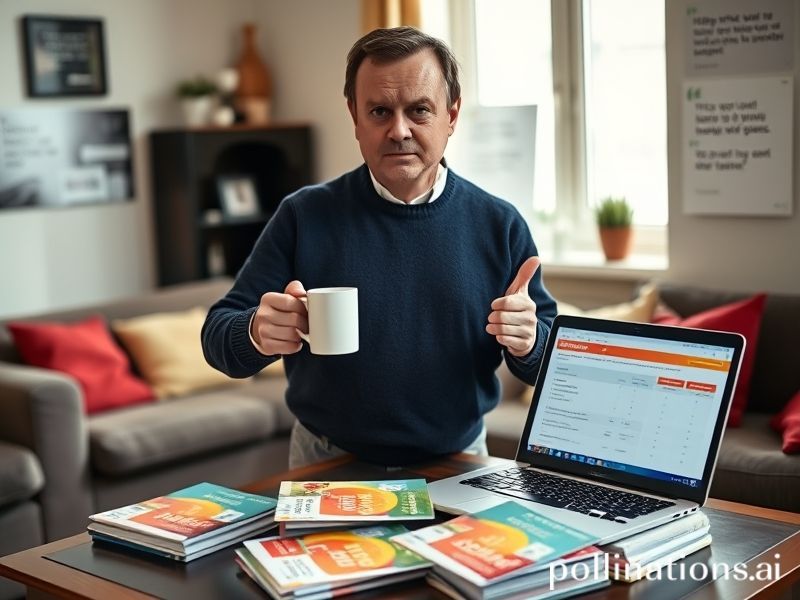From Manila to Reykjavík: How Martin Lewis Became the Unlikely Prophet of Global Penny-Pinching
From his perch above a London coffee chain that charges £4 for lukewarm existential dread, Martin Lewis—the man Britain trusts more than its own cabinet—has spent two decades coaxing savers toward marginally less awful interest rates. What began as a cheery BBC segment on “finding the best ISA” has quietly metastasised into a transnational coping mechanism: millions now import Lewisian wisdom from rainy Albion to places where the sun still shines but the banks still rob you blind.
Abroad, the phenomenon is equal parts miracle and punch-line. In Manila, a gig-economy driver toggles between Lewis’s weekly e-mail and a prayer app, hoping compound interest outruns inflation before the next typhoon. In Lagos, WhatsApp aunties forward “Martin’s top three easy-access accounts” to thirty-person group chats titled “FINANCIAL BREAKTHROUGH 2024!!!”—never mind that half the listed banks politely decline Nigerian IP addresses. The advice travels faster than a tax haven’s terms and conditions, yet lands with the same thud of reality: the best rate on offer is 4.35 % AER, which sounds heavenly until you remember that a single imported tomato now costs the same as a Tokyo subway ticket.
Global capital, ever the romantic, has responded by inventing “Martin Lewis Savings Account” as a generic trademark—like hoovering the carpet or googling your ex. Neo-banks from Reykjavík to Singapore slap his name (without permission, naturally) on teaser-rate adverts that expire quicker than a politician’s promise. Meanwhile, regulators in Brussels draft 47-page PDFs titled “Consumer Protection in the Age of Viral Savings Gurus,” accidentally boosting his SEO even further. The European Central Bank’s working paper on “Lewisification of Retail Deposits” sits unread next to staffers betting on how long before the phenomenon reaches Antarctica’s only ATM.
The macro implications are deliciously grim. When Mr Lewis tells Britons to ditch their 0.1 % high-street dinosaur for a fintech promising 5 %, the displaced billions don’t evaporate; they slosh through correspondent banks in New York, Frankfurt and, for old times’ sake, the Cayman Islands. Emerging-market central bankers watch sterling inflows like hawks eyeing carrion, praying the BoE keeps hiking so their own citizens’ remittances don’t melt into Monzo-shaped air. In effect, a bloke in a cheap suit doing sums on breakfast telly has become an accidental transmission belt for global monetary policy—Milton Friedman with a northern accent and better graphics.
And yet, the joke is on us. The real yield, after adjusting for the price of living, is roughly the same as stuffing cash under a mattress and letting the moths handle portfolio management. The accounts Lewis champions still park money in the same fossil-fuel giants, arms manufacturers and whatever conglomerate is currently laundering—sorry, “green-washing”—its image. Savers congratulate themselves on beating inflation by 0.7 %, blissfully unaware that the same banks are lending their deposits to hedge funds shorting the very currencies those savers need for their summer holidays. Somewhere in Davos, a private-equity partner sips a £300 whisky named after a peat bog and toasts Martin Lewis: the greatest unpaid salesman in the history of fractional-reserve banking.
So where does this leave the international saver, passport in one hand and a screenshot of “Top 10 Fixed Bonds” in the other? Precisely where they started: on a spinning rock where the house always wins, but at least now the house offers a slightly shinier welcome mat. The prudent move, as ever, is to diversify geographically, emotionally and existentially—keep a little cash in pounds, a little in dollars, and a little buried in the garden next to the broken dreams of 2008.
And if none of that works? Well, there’s always the Martin Lewis final recommendation: brew your own coffee, cancel that streaming subscription, and remember that in the grand casino of late capitalism, the only guaranteed winner is the guy selling the chips.







